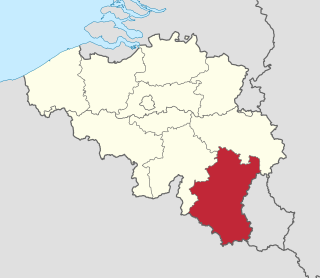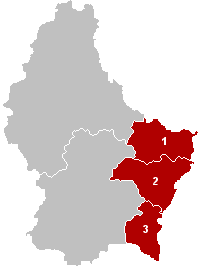Elections in Luxembourg are held to determine the political composition of the representative institutions of the Grand Duchy of Luxembourg. Luxembourg is a liberal representative democracy, with universal suffrage guaranteed under the constitution. Elections are held regularly, and are considered to be fair and free.

The Chamber of Deputies, abbreviated to the Chamber, is the unicameral national legislature of Luxembourg. Krautmaart is sometimes used as a metonym for the Chamber, after the square on which the Hôtel de la Chambre is located.
The Constituent Assembly of Luxembourg was a constituent assembly called in 1848 in Luxembourg to write and pass a new national constitution.

Partial legislative elections were held in Belgium on 5 and 12 July 1896. Under the alternating system, elections were held in only five out of the nine provinces: Antwerp, Brabant, Luxembourg, Namur and West Flanders. Thus, only 77 seats out of the 152 seats in the Chamber of Representatives were up for election. The Catholic Party retained their absolute majority.

Partial general elections were held in Belgium on 25 May 1902. The result was a victory for the Catholic Party, which won 54 of the 85 seats up for election in the Chamber of Representatives. Voter turnout was 95.7%.

Partial general elections were held in Belgium on 29 May 1904. The result was a victory for the Catholic Party, which won 38 of the 81 seats in the Chamber of Representatives.

Partial general elections were held in Belgium on 11 June 1850. In the Chamber of Representatives elections the result was a victory for the Liberal Party, who won 69 of the 108 seats. Voter turnout was 69.1%, although only 40,435 people were eligible to vote.

PArtial general elections were held in Belgium on 13 June 1854. In the elections for the Chamber of Representatives the Liberal Party and Catholics won 54 seats each. Voter turnout was 61%, although only 45,884 people were eligible to vote.
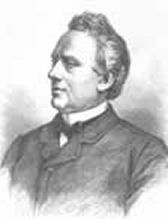
General elections were held in Belgium on 9 June 1868. In the elections for the Chamber of Representatives the result was a victory for the Liberal Party, which won 72 of the 122 seats. Voter turnout was 55.6%, although only 55,297 people were eligible to vote.
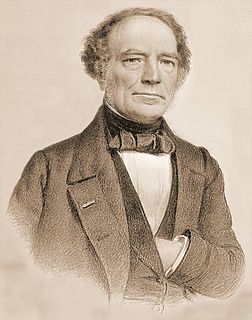
Partial general elections were held in Belgium on Tuesday 11 June 1872. In the elections for the Chamber of Representatives the result was a victory for the Catholic Party, which won 71 of the 124 seats. Voter turnout was 55.5%, although only 54,933 people were eligible to vote.

Partial general elections were held in Belgium on 13 June 1876. In the elections for the Chamber of Representatives the result was a victory for the Catholic Party, which won 67 of the 124 seats. Voter turnout was 67.5%, although only 63,278 people were eligible to vote.

Partial general elections were held in Belgium on 8 June 1880. In the elections for the Chamber of Representatives the result was a victory for the Liberal Party, which won 74 of the 132 seats. Voter turnout was 67.2%, although only 62,936 people were eligible to vote.

Partial general elections were held in Belgium on 14 June 1859. The result was a victory for the Liberal Party, which won 69 of the 116 seats in the Chamber of Representatives and 31 of the 58 seats in the Senate. Voter turnout was 55.9%, although only 49,672 people were eligible to vote.

Partial general elections were held in Belgium on 9 June 1863. The result was a victory for the Liberal Party, which won 59 of the 116 seats in the Chamber of Representatives and 33 of the 58 seats in the Senate. Voter turnout was 74.5%, although only 52,519 people were eligible to vote.

Legislative elections were held in Belgium in June and July 1884, for partial Chamber and full Senate elections respectively. Voter turnout was 79.1% in the Chamber of Representatives elections, although only 69,276 people were eligible to vote.

Partial general elections were held in Belgium on 12 June 1888. The result was a victory for the Catholic Party, which won 98 of the 138 seats in the Chamber of Representatives and 47 of the 69 seats in the Senate.
Partial legislative elections were held in Belgium on Tuesday 13 June 1837 in which 51 of the 102 seats in the Chamber of Representatives were elected. Voter turnout was 56.0%, although only 24,526 people were eligible to vote. Under the alternating system, Chamber elections were only held in five out of the nine provinces: Antwerp, Brabant, Luxembourg, Namur and West Flanders. The Senate was not up for election.
Partial legislative elections were held in Belgium on 10 June 1845 in which 48 of the 95 seats in the Chamber of Representatives were elected. Voter turnout was 77.0%, although only 22,771 people were eligible to vote.
General elections were held in Luxembourg on 28 September 1848. They were the first direct elections to the Chamber of Deputies. Doctrinaire Liberals, who had been in power since 1841, lost the election to progressive Liberals and Catholics who were supportive of the new constitution.
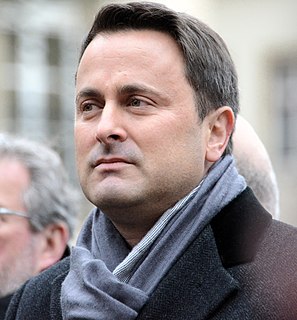
The First Bettel–Schneider Ministry was the ruling government of Luxembourg from 4 December 2013 to 5 December 2018. It was led by Prime Minister Xavier Bettel and Deputy Prime Minister Étienne Schneider. It was formed on 4 December 2013, after the 2013 election to the Chamber of Deputies. The government wa a traffic light coalition between the Democratic Party (DP), the Luxembourg Socialist Workers' Party (LSAP), and The Greens. It was succeeded by Bettel–Schneider Ministry II in December 2018.

